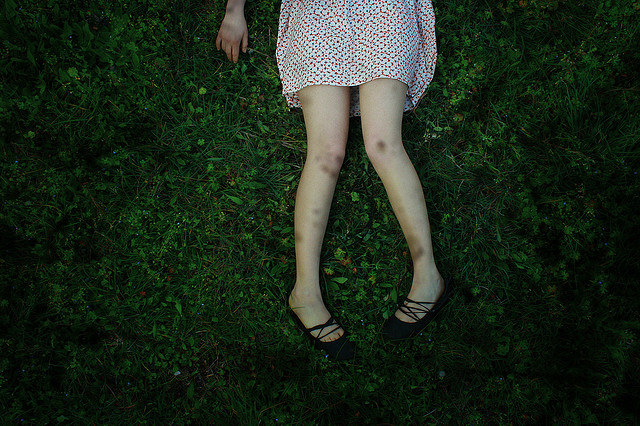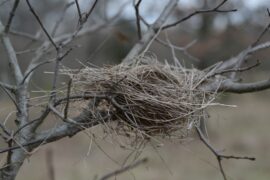Reem Abu-Baker
She is not dusty when I find her under the bed. Her arms and legs fold in toward her middle, like she was stuffed quickly beneath the box springs. Pinkish scars rise where I took a lighter to her last time. Last time was March, and she burned for seconds before my boy ripped her away, slashed out the flame with his hand. Last time, her edges ashed while we buried her under garbage and set the can on the curb for pickup.
This time, I throw her onto my boy’s bed and I let her unravel. I leave his house, drawers of my clothing piled across the floor.
Echoes stick to the corners of my own apartment, the surfaces dulled by the dust that’s settled in my absence. I walk from wall to wall, following the mites as they blow across the wood. In my bedroom, I sweat over the empty dresser, kick at where my unframed mattress touches the floor. I don’t dress after I shower. The water runs off me and into the couch cushions.
When my boy calls, he says he’ll bring everything by. But he comes to the door empty-handed and wearing a suit.
She means nothing, he says.
I ask if she’s still lying on the bed, and how many blondes he’s been fucking.
Your lips are perfect, he says. Your hair is all over.
Here is the truth: White girls do not die.
My boy’s left my clothes black-bagged in his car. Not until we talk, he says, and then I am on my back on the couch and he is on me. He kisses my skin in inches. He covers me in saliva and he covers me in semen, and I close my eyes to imagine my own skin different, shining under the window.
Shirt still on, he pulls his pants up from his knees, picks his jacket up from the floor, walks to the bathroom. He tosses me a towel.
I love his red freckles and the way the skin behind them looks stretched to almost blue. I say thanks as I catch the towel. I let him dress me from the bag he drags out of the backseat. He wraps me in lace. He loves me in pink. In the car, driving toward his house, his hand grasps above my knee.
He says we can try to kill her again, that this time he’ll mean it, this time with the broad knife from the kitchen. His eyes wide like he believes himself.
Both of us sitting on the bed, I take his hand, guide it across her skin, her lips, her split ends. Together we clasp her, lift her above us from the underarms and let her catch the lowering sunlight. The light prisms off her knees, her elbows, her fingernails. We hang her, thumbtacks through the tangles of her thin, yellow hair—scars toward my side of the bed, dress dancing above us.
My boy leans back across the bed, looks up at the girl, sets his fingers on the top of my head as I lie against him. I feel something build in his chest, a sigh or a sob that grows then settles behind his ribs. On the wall, the white girl swings just a little. Her leg taps lightly on the paint, and I think she is beautiful, and I smell my boy’s sweat, and I feel sorry.
Reem Abu-Baker lives in Tuscaloosa, where she attends the MFA program at the University of Alabama. Her writing has appeared in journals including Timber, The Literary Review, and Barely South Review.


